A Peek Inside North Korea Paints A Grim Picture
A recent defection from North Korea gives us a peek inside the DPRK, and it's not pretty.
Early last week, in a story that only got minimal coverage here in the United States, a North Korean soldier defected to South Korea via a daring run across the Demilitarized Zone marking the border between the two countries. As he tried to escape, he was shot at by North Korean troops but managed to make it across anyway, at which point he was taken into custody by South Korean forces and appeared by all accounts to be safe in the Republic of Korea. Over the weekend, though, we learned that he was suffering from serious medical problems that could point to serious problems inside the North Korean military:
SEOUL, South Korea — A North Korean soldier’s bold attempt to defect by crossing the heavily guarded border with South Korea galvanized attention this week.
But perhaps more surprising was the disclosure by surgeons struggling to save his life of what they found while repairing his intestinal wounds: dozens of parasitic worms, some as long as 11 inches.
“In my 20 years as a surgeon, I have only seen something like this in a medical textbook,” said Dr. Lee Cook-jong, a lead surgeon.
The discovery opened a window on the dire conditions in North Korea, including poor hygiene and nutrition. The news shocked many people in prosperous South Korea.
Surgeons raced to save the North Korean soldier, whose name and rank have not been released, who sustained serious bullet wounds racing across the border while his own troops fired on him.
“We have found dozens of fully grown parasitic worms in his damaged intestines,” said Dr. Lee Cook-jong, a lead surgeon. “It was a serious parasitic infection.”
During a news briefing this week, Dr. Lee showed photographs of worms as long as 10 or 11 inches.
Experts in parasitic worms were not surprised, however. They said that the finding was consistent with the broad sense of conditions in the isolated, impoverished North.
Defectors to the South have cited the existence of parasites and abysmal nutrition. Because it lacks chemical fertilizers, North Korea still relies on human excrement to fertilize its fields, helping parasites to spread, the experts said.
In a 2014 study, South Korean doctors checked a sample of 17 female defectors from North Korea and found seven of them infected with parasitic worms.
The soldier’s condition was particularly noteworthy because North Korean soldiers, especially those deployed near the border with South Korea, receive priority in food rationing. Yet, in addition to the parasitic worms, doctors found kernels of corn in his stomach.
South Korea itself was afflicted with widespread parasitic infections through the 1970s, when more than 80 percent of the population carried parasitic worms. After a 9-year-old girl died in 1963 and doctors found more than 1,000 parasitic worms in her body, the country launched a national campaign to eradicate parasites.
Schools collected stool samples from students and distributed anti-parasitic pills. The campaign succeeded: Parasitic infections have become rare in South Korea as hygiene and economic conditions have improved.
More than 30,000 North Koreans have fled to South Korea since a famine killed more than a million people in the North in the 1990s. Since then, international relief agencies have reported widespread malnutrition and stunted growth among many children in the North.
More from The Guardian:
Parasitic worms have been found in a North Korean soldier critically injured while defecting to South Korea, highlighting nutrition and hygiene problems that observers believe have plagued the isolated country for decades.
Dozens of flesh-coloured parasites, one of which was 27cm (11 inches) long, were found in the man’s digestive tract during life-saving operations, according to the lead surgeon, Lee Cook-jong.
“In my over-20-year-long career as a surgeon, I have only seen something like this in a textbook,” Lee said.
The parasites, along with kernels of corn in his stomach, appear to confirm what many experts and defectors have said about the food and hygiene situation for many North Koreans.
Prof Choi Min-ho of Seoul National University’s college of medicine said: “Although we do not have solid figures showing health conditions of North Korea, medical experts assume that parasite infection problems and serious health issues have been prevalent in the country.
“[The man’s condition is] not surprising at all considering the North’s hygiene and parasite problems.”
The soldier was flown to hospital by helicopter on Monday after his escape to South Korea under fire from North Korean soldiers.
He is believed to be an army staff sergeant in his mid-20s who was stationed in the Joint Security Area in the UN truce village of Panmunjom, said Kim Byung-kee from South Korea’s ruling Democratic party. North Korea has not commented on the defection.
While the contents of the defector’s stomach do not necessarily reflect the wider population, his status as a soldier with an elite assignment suggests he would at least be as well nourished as an average North Korean.
(…)
Parasitic worms were also common in South Korea between 40 and 50 years ago, Lee said, but disappeared as economic conditions improved.
Their continued prevalence in North Korea could be linked to the use of human excrement as fertiliser, often referred to as night soil.
Lee Min-bok, a North Korean agriculture expert, said: “Chemical fertiliser was supplied by the state until the 1970s, but from the early 1980s, production started to decrease.
“By the 1990s, the state could not supply it any more, so farmers started to use a lot of night soil instead.”
Doctors said the soldier’s height was 1.7 metres (5ft 7in) and his weight 60kg (9st 6lb). Use of the corn found in his stomach, which is cheaper than rice but less popular, has increased in years when North Koreans are more worried about harvests.
Between January and September, China exported nearly 49,000 tonnes of corn to North Korea, compared with 3,125 tonnes in 2016, according to figures from Beijing.
Malnutrition in North Korea is hardly a new thing, of course. The country has long been unable to feed itself without aid from China and the West, and it was just twenty years or so ago that several years of failed harvests led to famine that reportedly led to widespread starvation and death to an extent that the government never publicly acknowledged and which even today isn’t fully known. One can also see the evidence of the inferior diet in the North in medical facts. For example, it’s been reported that this soldier, who is believed to be in his late 20s is 5 feet three inches tall and weighs 132 pounds. By contrast, the average male high school age senior in South Korea is 5 feet 8 inches tall and weigh 154 pounds. There are similar statistics for the North Korean and South Korean populations as a whole that demonstrate the extent to which more than seventy years of dictatorial rule have had on that country.
As noted, the fact that a member of the North Korean military stationed at one of the most heavily militarized spots in the world was in such dire medical condition raises real questions about just how healthy the population in general, and the fighting forces of the North Korean in particular, actually is and what this could mean in the event of a future military crisis. Past reporting has always indicated that the leadership in Pyongyang has always made sure that the military is well-fed, well-supplied, and given special treatment not available to the general public. In part, of course, this is attribute to saying originally attributed to Napoleon that an army “travels on its stomach,” meaning that a malnourished military will not be in proper shape to fight should the need arise. Additionally, though, there has likely always been a concern among those in the inner circle of the Kim regime that the biggest threat to their power would come from a military that was not treated sufficiently well. This isn’t a concern unique to North Korea, of course. As we can see from the events currently going on in Zimbabwe, as well as past example of a military rising up against an authoritarian regime, the biggest threat to the power of a ruler like Kim Jong Un doesn’t come from the people in the street or the American and South Korean military forces on the other side on the DMZ, but from the people around him, including the military. This is why dictators try to keep potential sources of rebellion happy and under control, because of the fear that they will rise up and threaten the dictators hold on power. The fact that this soldier, who was presumably among the supposedly elite forces stationed on the tripwire of the DMZ border, is malnourished and infected with worms is, potentially, a sign that things aren’t quite as good for the military in the DPRK as we’ve been led to believe.
The other takeaway from this, of course, is what it tells us about the probable condition of the civilian population inside North Korea. We don’t often get to see what’s going on there, of course, and when we do it’s from reports from western news agencies taken on carefully guided tours of the country. These tours inevitably show us seemingly healthy, happy people making their way around Pyongyang and perhaps some limited views of the countryside, but that’s about it. We don’t get to ee what life is like for the average North Korean, much less what conditions people who live in the rural and mountainous areas of the country might be dealing with.Suffice it to say, though, that if members of the military stationed at the DMZ are malnourished and infested with parasitic worms, then one can only imagine what the general population is going through.
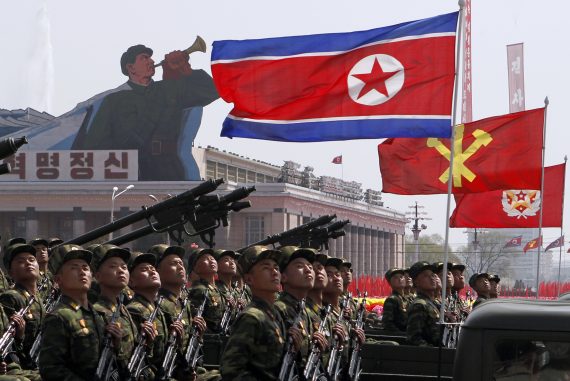

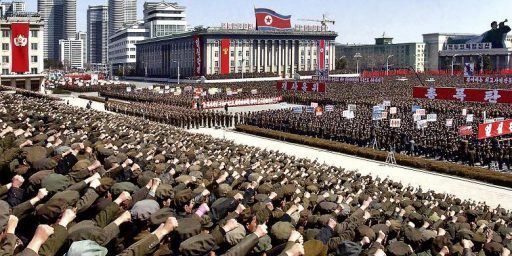
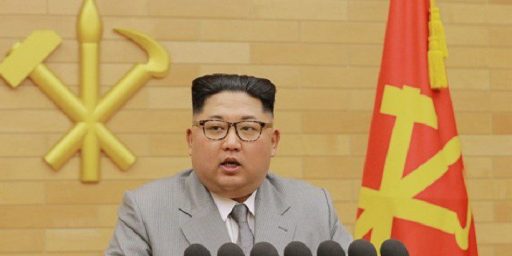

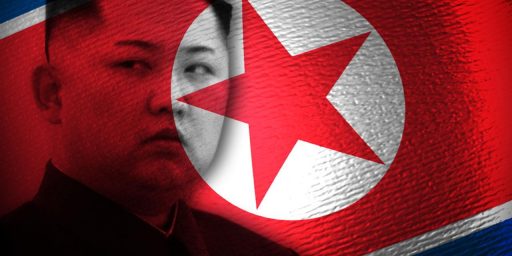
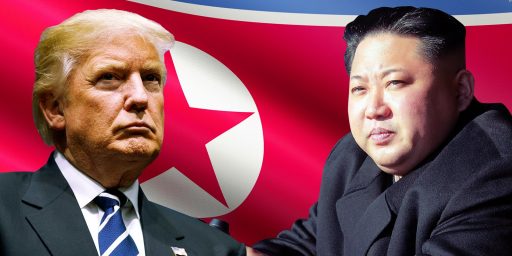
It is also notable that DPRK is relying on corn as the staple starch. Unslaked corn is not fully digestible and cannot provide necessary nutrients which can lead to diseases such as pellagra, a niacin deficiency.
FWIW, I wonder if they mean “corn” in the US sense, or “corn” in the UK sense, meaning any food grain?
@MarkedMan:
The World Food Program describes it as maize, which would be corn in the U.S. sense. In any case, the soldier had kernels in his gut.
The WFP describes the NK diet as maize/rice, kimchi, and bean paste, lacking in protein and essential fats.
A country that is malnourished. You have to wonder just ready the NK military is. Everyone paints the bleakest possible scenarios for this country but little is known about NK. One thing we do know is the country can’t feed itself. An Army marches on its stomach.
Bill,
Ultimately, that’s my point. If this guy is typical of members of the North Korean military then one has to wonder just how effective a fighting force they really are.
Since my TV at home does not get any channels I rarely view Network or Cable news broadcasts.
The internet and AM-FM radio are my prime sources of information.
I know I was aware of the NK soldiers defection a week ago. Likely from a radio bulletin.
A google search shows that the story was reported by CBS News, New York Times, Bloomberg and WSJ datelined 11/13/2017 and the Northwest Arkansas Democrat-Gazette 11/14/2017.
I am curious about what constitutes minimal coverage.
@Doug Mataconis:
Doug,
What was it about a week ago that you were painting a dire picture if we attacked NK. I have questioned NK military readiness back to the days when I contributed over at the blog ROK Drop and that’s over 5 years ago.
And I think that picture still needs to be kept in mind. It doesn’t take much energy to press the buttons necessary to launch thousands of missiles into the heart of downtown Seoul.
Also, I am not saying definitively that this one soldier tells us anything about the state of readiness of the military, or of their willingness to die to defend the regime. A war on the Korean Peninsula, even though it would likely end in victory for the US/ROK, would be entirely unlike anything we’ve seen in half a century.
Mister Bluster,
As was I, but it certainly wasn’t top of the fold news and it was largely drowned by the reports about Roy Moore, Franken, and the rantings of the Mango Manchild.
Which is why past administrations’ failures to stem the NK nuclear program is so tragic. We can only hope for better from the current administration and the coalition they are developing around NK. The one thing we know, the “experts” in DC are pretty worthless given their penchant for doing the same thing over and over, expecting different results.
This Free Thoughts podcast interview with author Micheal Malice is enlightening about North Korea. His book, Dear Reader: The Unauthorized Autobiography of Kim Jong Il (2014) was aimed at the popular market.
In other police abuse news, think Alex Wubbels times 900, a Sheriff in Georgia gets suspended by the Governor 6 months after he and deputies did body searches of every student at a high school without a warrant.
https://www.officer.com/command-hq/news/20982831/georgia-gov-nathan-deal-suspends-indicted-worth-county-sheriff-jeff-hobby
The Sheriff has been charged with sexual battery too. Plus his son arrested for marijuana possession.
I don’t know why this outrage never got the publicity that the Wubbels case did. Maybe its the lack of video. Either that to paraphrase a saying- An abused nurse is a tragedy, 900 abused students is a statistic.
@Bill:
The concern with NK’s military isn’t that they’d be able to hold out long, it’s that Seoul is within artillery range of the border and the city would be more or less completely flattened within the first few hours of the war.
@Bill:
I’m actually afraid that people will attempt to muster this report to somehow shore up the idea of a preemptive invasion of NK. Much like with Iraq, issue has never been could the NK stand up to the US forces.
There is the question of what damage NK might be able to do to it’s neighbors in the meantime (with both conventional and nuclear weapons). There’s also the issue of invading a country that’s right next to China.
And, most importantly, there is the issue that if we are doing this to secure NK’s nukes, then we need to occupy the country for an extended period of time. What in the US’s recent history suggests that we can successfully handle such an occupation or successfully disentangle ourselves once that occupation is over?
If Afghanistan and Iraq has taught us anything, it’s that toppling a government is easy. It’s everything else that we will completely fuck up.
@JKB:..The one thing we know, the “experts” in DC are pretty worthless given their penchant for doing the same thing over and over, expecting different results.
What is your remedy for this situation?
@JKB:
I sincerely hope you are including preemptive military intervention in that “same thing” category.
Were the Mongols better-fed than the Chinese? Were the Vandals better-fed than the Romans? Were the Conquistadors better-fed than the Aztecs or the Incas? Japanese troops were often on the edge of starvation in WW2, but a bunch of well-fed American Marines and soldiers discovered that they still fought pretty damn well. I would caution against reading too much into this.
We may well see mass defections from the North Korean army should war come, and should circumstances allow, but a few hundred loyal guys can launch a nuclear-tipped missile and a few thousand artillerymen can destroy Seoul.
And there’s this to consider: if the military is that bad off, what do you suppose life is like for the peasants? Who is depriving them of fertilizer? Who is starving the North Korean people? We are. We are carrying out what amounts to a siege, starving the civilians first and foremost in the hope that the baron, prince, king, dictator gets bumped off. We are ensuring mass starvation in a foreign country despite the fact that they have not attacked us. There are children starving to death because of our actions.
Can we justify this morally? Is it OK that we starve children because we don’t like the government over which they have no control?
@Mister Bluster:
Electing the most corrupt, incompetent and weak person ever to occupy the White House.
The Chinese and the South Koreans are worried about any collapse of government or society in NK, caused by war or famine or anything else. If people there panic they will likely head for the borders and starving, desperate, disoriented people by the millions will pour into those two countries. War would make that 100 times worse.
Another concern. Just how good is NK military infrastructure? This bit of news is interesting.
http://www.newsweek.com/north-korea-nuclear-test-site-collapse-killed-200-people-report-696878
I have as much special insight on North Korea as some so called experts. Tiddly squat.
@Bill:..I have as much special insight on North Korea as some so called experts.
Please provide the names of the experts you are mocking. Examples of their work would be a plus.
@Matt Bernius: “There is the question of what damage NK might be able to do to it’s neighbors in the meantime (with both conventional and nuclear weapons)” Precisely. South Korea is a hostage to DPRK. The US would be idiotic to act like an international SWAT team going in to take out the hostage taker who has the house wired to take out the entire neighborhood.
And what should have past administrations done? Invaded? Launched our own nukes on NK?
@MarkedMan: In South Korea–and so I assume NK will be at least similar–the various types of food grains are “bap” or “rice.” Koreans in the south eat rice, barley, millet of various colors, and corn (mostly sweet corn on the cob, which is considered a vegetable rather than a grain just like here) and call it all “rice.” Specifically though, they call each “bap” by separate identifiers–borri bap (barley), gijang bap (millet), and so on. While I was there, my Korean friends would talk about North Koreans needing to eat “corn rice” and how hard it was on peoples’ stomachs, so I have to guess that NK people eat hard grain corn as their primary starch.
At the Korean grocery store that I shop at, I sometimes buy “18 grain rice” which contains the 4 or 5 usual rices plus oats, rye, barley, and millet but no corn or wheat.
Based on my time there, if NK soldiers are eating corn now, food supplies may be really slim because the complaint about sending rice to NK while I was in SK was that most of it went to the Army.
@Doug Mataconis: I will say it again: if there was ever a war that would meet Edwin Starr’s description of being good for “absolutely nothing,” it would be a war against NK. Terribly destructive, heartbreakingly deadly, and mindbogglingly useless.
@Matt Bernius:
This would be completely different because the North Koreans would be so grateful that we freed them from the oppression of Kim Jong un that they would welcome us with open arms.
@michael reynolds: That is indeed food for thought.
How would you prefer to see this play out? Yeah, we could give them food. It’s not going to win any hearts and minds (yes I realize that the main goal is nutrition). In fact it would probably just make the people support Kim Jong Un even more, because of the way their media would paint it.
Do you see North Korea somehow getting normalized, meaning internationally accepted as a nuclear power? With a cult leader still at the top?